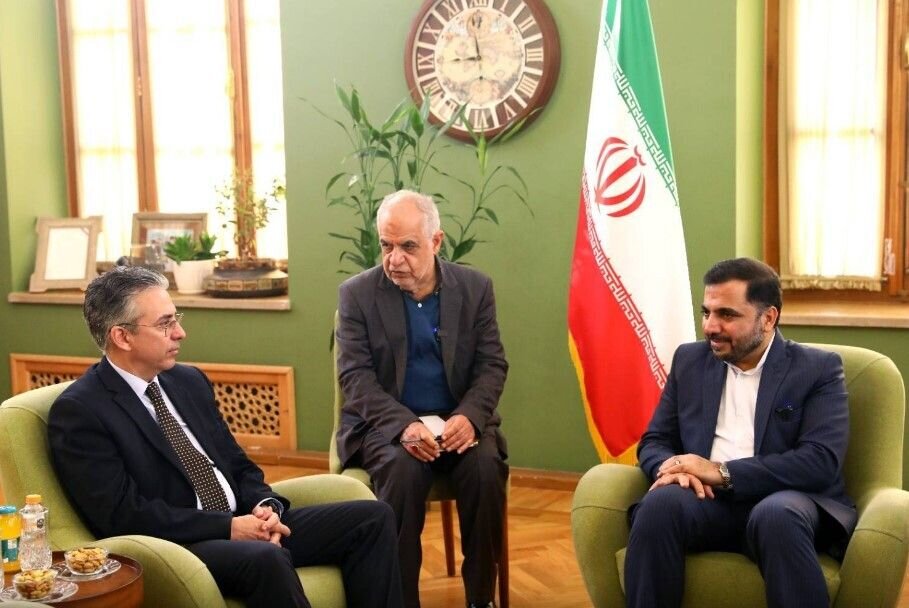Iran ready to assist Cuba for ICT growth

TEHRAN – Iranian companies are ready to enter the Cuban market and transfer their experiences in the field of information and communications technology, ICT minister Issa Zarepour has said.
He made the remarks in a meeting with Cuba's First Deputy Minister of Communications, Wilfredo González Vidal, in Tehran on Monday, IRIB reported.
“It is important for Havana to develop strategic relations with the Islamic Republic of Iran in all fields,” IRIB quoted the Cuban official as saying.
Underscoring Tehran's experiences and capabilities in areas related to ICT, González Vidal went on to say that boosting cooperation between the two countries is of more importance. “Cuba is eagerly waiting for the presence of Iranian companies in the country to expand the information and communications technology.”
He further noted that since the ICT industry has a special place in the 2030 agenda for sustainable development of the country, the expansion of communication networks and electronic governance are the top priorities for cooperation.
Referring to Iranian companies’ capabilities in the ICT sector, Zarepour, for his part, said that the companies are ready to cooperate with Cuba in different fields such as developing the communications infrastructure, launching various platforms, and implementing optical fiber projects.
They can also help Cuba with the generational transition of the communication network from the second and third to the fourth and even provide the ground for entering the fifth generation, he added.
“Moreover, Iran’s experiences in e-governance can be shared with Cuba.”
Co-op in smart e-governance
Iran and Cuba have also announced readiness to exchange knowledge and experience in electronic governance and related fields.
The agreement was reached following a memorandum of understanding signed in June and the subsequent signing of the joint action plan between the two countries.
In this line, Iran’s Deputy Minister of Information and Communications Technology, Mohammad Khansari, met González Vidal virtually on December 13, 2023, Mehr news agency reported.
Khansari, referring to the history of cooperation between the two countries and the recent visit of Cuban President, Miguel Diaz-Canel, to Iran, emphasized, “Iran is ready to exchange experiences in communication fields, especially smart electronic governance.
While enumerating the records of cooperation between Iran and Cuba in various fields, including vaccine production during the Coronavirus pandemic, Khansari announced Iran's readiness to expand cooperation in sharing knowledge and technology.
For his part, Javad Movahhed, the deputy head of the Information Technology Organization, explained the implementation of the electronic and smart governance project in Iran.
He went on to enumerate the conceptual model of the electronic government, the most important projects being implemented, and the development of the organization, including the smart government unit window, the national license portal, the national information exchange center, and the land management window. He also listed achievements in this field.
Gonzales Vidal, welcoming the issues raised in the meeting, stated that Cuba is interested in using Iran's experiences in the field of smart e-governance, especially in the field of education, and also using the capacities of Iranian companies in order to meet Cuba's technological needs.
Tech-ties
On the sidelines of the Cuban president’s visit to Tehran on December 5, 2023, a memorandum of understanding was signed between the Iranian Vice Presidency for Science, Technology, and Knowledge-Based Economy and the Ministry of Science, Technology and Environment of the Republic of Cuba.
The main objective of this agreement was to promote and expand scientific and technological cooperation based on the principles of equality and mutual benefit, in accordance with the relevant laws and regulations, through the development of joint cooperation projects in the fields of science and nanotechnology, biotechnology, climate change, and other areas agreed by the parties.
The agreement also included the exchange or designation of scientists and researchers to carry out joint projects and share experiences, transfer, or exchange technology in the fields of science, technology, and innovation.
Moreover, it involved organizing or providing support to hold symposia, conferences, forums, seminars, workshops, and training courses in areas of mutual interest.
Establishing a joint working committee and a joint science and technology center were other goals of the agreement.
MT/MG
Leave a Comment